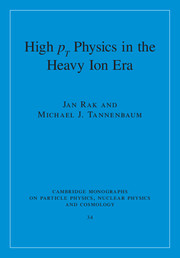Book contents
- Frontmatter
- Contents
- Preface
- 1 Introduction and overview
- 2 Basic observables
- 3 Some experimental techniques
- 4 The search for structure
- 5 Origins of high pT physics – the search for the W boson
- 6 Discovery of hard scattering in p-p collisions
- 7 Direct single lepton production and the discovery of charm
- 8 J/Ψ, ϒ and Drell–Yan pair production
- 9 Two particle correlations
- 10 Direct photon production
- 11 The search for jets
- 12 QCD in hard scattering
- 13 Heavy ion physics in the high pT era
- 14 RHIC and LHC
- Appendix A Probability and statistics
- Appendix B Methods of Monte Carlo calculations
- Appendix C TAB and the Glauber Monte Carlo calculation
- Appendix D Fits including systematic errors
- Appendix E The shape of the XE distribution triggered by a jet fragment, for example, π0
- Appendix F kT phenomenology and Gaussian smearing
- References
- Index
4 - The search for structure
Published online by Cambridge University Press: 05 May 2013
- Frontmatter
- Contents
- Preface
- 1 Introduction and overview
- 2 Basic observables
- 3 Some experimental techniques
- 4 The search for structure
- 5 Origins of high pT physics – the search for the W boson
- 6 Discovery of hard scattering in p-p collisions
- 7 Direct single lepton production and the discovery of charm
- 8 J/Ψ, ϒ and Drell–Yan pair production
- 9 Two particle correlations
- 10 Direct photon production
- 11 The search for jets
- 12 QCD in hard scattering
- 13 Heavy ion physics in the high pT era
- 14 RHIC and LHC
- Appendix A Probability and statistics
- Appendix B Methods of Monte Carlo calculations
- Appendix C TAB and the Glauber Monte Carlo calculation
- Appendix D Fits including systematic errors
- Appendix E The shape of the XE distribution triggered by a jet fragment, for example, π0
- Appendix F kT phenomenology and Gaussian smearing
- References
- Index
Summary
Rutherford scattering
Shortly after the discovery of the radioactivity of uranium by Becquerel in 1896 [155] and its ability to ionize gases, Rutherford [156] began a study of the rate of discharge of a parallel plate capacitor in gas by placing successive layers of thin aluminum foil over the surface of a layer of uranium oxide on one plate. He concluded that “the uranium radiation is complex, and that there are present at least two distinct types of radiation: one that is readily absorbed which will be termed for convenience the α radiation, and the other of a more penetrative character, which will be termed the β radiation.” In 1906, Rutherford [157] observed that α particles from the decay of radium scattered, i.e. deviated from their original direction of motion, when passing through a thin sheet of mica, but did not scatter in vacuum. He made this observation by passing α particles through narrow slits and making an image on a photographic plate. In vacuum, the edges of the image were sharp while the image of α particles that passed through the mica was broadened and showed diffuse edges. This observation was controversial because it was not expected that α particles would scatter [158]: “Since the atom is the seat of intense electrical forces, the β particle in passing through matter should be much more easily deflected from its path than the massive α particle.”
- Type
- Chapter
- Information
- High-pT Physics in the Heavy Ion Era , pp. 64 - 84Publisher: Cambridge University PressPrint publication year: 2013

